- Home
- Roger Zelazny
Madwand (Illustrated) Page 19
Madwand (Illustrated) Read online
Page 19
The coldness had invaded his entire body now, but he made no move to withdraw from the serpent figure of the Gate against which he leaned. It was almost as if it had invited him to position himself just there . . .
“It’s a shame,” Spier said, “because I was beginning to like you . . . ”
Pol hit him. He summoned up every bit of the power he could muster, backed it with all of his will and hurled it at the man.
Very slowly, Henry Spier unscrewed the cigarette from its holder, dropped it upon the floor and stepped on it. He replaced the holder in some hidden pocket beneath his cloak. It had to be sheer bravado. Pol knew that the man must be feeling the force of his attack. But the display was effective. Pol felt a tremor of fear at Spier’s power, but he maintained the siege and reached for even more force to back it. He was committed now, and he felt as if he were sliding down a long tunnel which ended in blackness.
Spier raised his eyes and they bored into his own. Pol suddenly felt a resistance rising.
Spier took a step toward him.
It was as if he suddenly faced a heat backlash, as if the target of his exertions stood directly before him rather than some distance away.
Frantically, he switched to the second seeing. His vision focused upon Spier, advancing upon him, fists raised. The image of Spier, still standing in the distance, faded. The man’s face was twisted into a smirk and perspiration dotted his brow. His fist was already moving.
Pol’s concentration was broken. He ducked forward, raising his hands to protect his face. He heard a solid thunk, followed by a brief cry and realized immediately that Spier’s blow had fallen upon the Gate.
He dropped his hands and drove his left fist, followed by his right, into Spier’s abdomen. The blows had surprisingly little effect. The man was solid.
Even as he swung a left uppercut and felt it connect, he realized that the main pain the man seemed to have felt was in the bloodied knuckles of his right hand, which he now held in an awkward position. Pol immediately threw a right toward his face, but this blow was blocked. Then Spier rushed him.
Spier’s bulk crashed into him, driving him back against the Gate. Pol was dazed as his head struck upon it. Then Spier stepped back and their eyes met again.
He called upon the dragonmark to raise a defense as a shock ran through his entire system like a jolt of electricity. He struck out with the power he had wielded earlier, but it barely seemed to shield him against the forces the other was turning against him. He felt a pressure beginning to build, not unlike that which Ryle had turned upon him. Both he and Spier stood absolutely still now, and though he threw everything he had into the defense, the pressure continued to mount.
A throbbing began in his temples and his breathing became labored. He grew damp with perspiration, though he still felt abnormally cold. A wave of dizziness came and went, came again. He felt that he might only be able to hold Spier off for a few more seconds. His defenses would crumble, the man would place him under control, force him to produce the statuettes and then possibly use him for the sacrifice. Where was the flame which had guided him, protected him?
He seemed to hear faint, mocking laughter. In that instant he realized that this was the end toward which they had guided him. They wanted the Gate opened. If he were not willing, then they would not protect him against the one who would.
His vision began to fade as the vertigo retuned. If this were to be the end, then at least he ought to try inflicting a final hurt upon his enemy.
He placed his right foot flat upon the door behind him and thrust himself forward toward Spier, striking outward and upward with both fists.
He was surprised that his blow actually landed. The last thing that he saw before he fell was the look of astonishment on Spier’s face as the man toppled over backwards.
A wave of darkness rushed through Pol’s head. He felt nothing as he hit the floor.
XIX.
Drifting. He was drifting through blackness and silence. His only other sensation was a feeling of intense cold, but after a time this passed.
For how long he drifted, he could not tell—moments, ages . . . The sensation was not unpleasant, now that the coldness had passed. Memory required too much effort. He only knew that it was good to know something of rest, of an end to all exertion.
A gentle rocking motion began. Even so . . . It was hardly disturbing. But then motion commenced in a single direction. He rode with it, still feeling the rocking as he was drawn along.
He perceived a feint light. It seemed to be coming from all directions, but he did not wonder at the variety of sensory apparatus the sensation might require. His consciousness was growing, but portions of his mind were numb.
The light grew and the motion continued. Whatever was below seemed a pale yellow with smoky patches.
Now the prospect grew clearer, but his sense of perspective was warped. The light values were strange, and there was no way of determining his distance from the slowly resolving objects below. It was a broken land, rocky, sandy, shadowed, with wind-borne clouds of dust and low-lying, snaky mists. But there was nothing recognizable for contrast, nothing to provide a scale. Yet the place was familiar. Where? When?
He dropped lower. Were they mountain peaks or low ridges above which he moved?
And where was he going? Was he controlling his own movements, only drifting, or both? Or neither? It almost seemed—
He was moving alongside one of the larger stone prominences. Suddenly, he rounded it and the matter of relative proportions was resolved.
About ten feet below him, high on a stake, a demonic head was impaled. Something which might be classifiable as a grin drew the dark, scaly face tight. The eyes were fully opened, very black and appeared to be staring directly at him.
He felt something akin to a shudder as he was swept on past the grisly thing, with the distinct impression that it had winked at him. The wasteland fell farther below him as he soared into a twilit area of pale stars in a pale sky above the level of blowing dust. Here the wind still blew, cold, with a moaning sound, empty of everything.
Far below now, the features of the landscape fled backward. A fountain of sparks rose as if to intercept him, but he veered far wide of it. Shortly afterwards, a crashing metallic note filled the air, as of the striking of a great gong, the reverberations of which seemed to remain with him for many long minutes.
A bright meteor cut a long, slow trail above and before him; and he heard a sound like thunder though there were no clouds in the sky. His velocity seemed to increase, and the moaning of the wind rose in pitch. Far below him, the dark and light patches of the land moved in a sea of distortions, rendering themselves into momentary faces—elongate, twisted, beautiful, alien, angry, composed, bereft. He passed over a shattered city above which dark forms hovered and turned. Small blue lights darted amid the ruins. Occasionally, the dark things fell upon one and extinguished it. He passed above a black tower from whence a lovely, liquid-voiced singing emerged. A squat, many-legged creature with a juicy, cracked skin, lay like a rotten plum atop it. A brazen chariot passed silently through the middle air, driven by a dead-white being muffled in saffron, drawn by long-tailed creatures whose breath emerged in white clouds to congeal and fall as crystals upon the winds. In a moment, the apparition was gone, and he began to doubt whether he had actually seen it.
A tinkling, as of hundreds of tiny bells, accompanied his passage above a gray plain where armies of humans and demons stood frozen in martial attitudes beneath some ancient enchantment whose fringes he had touched. Ahead of him then, the horizon was broken along its entire length—a thin, irregular edge of the world, rising. He focused his attention upon it.
It grew into a saw-toothed band and then a rampart—mighty, towering and black. For a long while it seemed that at any moment he might be dashed against the great range. And then a shifting of light lay a new perspective across the land, and he realized that it was incredibly distant, incredibly huge. Something tigh
tened within the cloud of his being as he realized intuitively that he must pass over it.
Below, the hidden features of the land were still revealed in fragmentary flashes. He no longer had vision to the rear, but he felt, vaguely, that something was following him. Briefly, he assaulted the frozen part of his own mind, with inquiry as to what he was, where he had come from. Nothing yielded, the brief frenzy passed and forgetfulness of its occurrence ensued. He continued his contemplation of the world before him, realizing that he had come this way before, knowing that this time it was different, knowing that he had a mission to fulfill.
The mountains loomed even larger, and he knew that—no matter what the nature of his form—their traversal would not be easy. He began studying their silhouette, looking for a low area, a gap—anything that might ease his passage. He thought that he detected such a place off to the left, and he made an effort to direct his course toward it.
He was surprised when this actually occurred. It was his first voluntary act that he could recall since coming into consciousness, and it pleased him to see it prove fruitful. Immediately, however, he wondered what had been directing him up until this time.
He became aware then of a kind of tugging, of the sensation of being drawn onward by something beyond the mountains, something which was willing to give him a little leeway, that he come more rapidly and safely into its lands. He exerted himself again, and his velocity increased.
As he drew nearer to the mountains it seemed that he grew more tangible than he had been earlier. For now he began to meet with resistance, to feel the buffeting of the winds.
The mountains towered above him, their peaks vanishing in the darkness overhead. He rose to an even greater altitude as he came nearer, approaching the gap. The winds caught him and cast him back down, screaming now in their passage.
He stabilized himself and mounted again, moving even nearer to the rocky face as he ascended. This time he rose higher before the screaming winds forced him back.
On his third attempt, he moved more rapidly, driving himself upward with great force, the slope of the mountain becoming a dark blur before him. When the winds finally took hold of him, he fought them, almost reaching the level of the bright gap before he was forced downward yet again.
The fourth time he tried a different angle of attack and was beaten back almost immediately.
He hovered at a lower altitude, recovering orientation and stability, mustering fortitude. He massed his energies once more. Then he began to rise.
This time he followed the best course he had taken earlier, close to the face of the mountain. He hurled himself upward, attempting to exceed all earlier velocities.
The wind curled about him and played upon him as on the string of some musical instrument. He throbbed to its vibrations as he fought it. He continued to rise against its pressures, but he felt the rapid dissipation of the energies which composed his being. A feeling came over him that if he did not make it up and through this time, he would be swept away to drift for perhaps half of an age before he recovered sufficient strength to try again.
As the battering increased and he felt himself slowing he invested all of his remaining strength in an attempt to continue the upward drive. A momentary lull permitted him a great gain, but the assault began again just as he neared the gap.
“Whoever you are that calls,” he cried wordlessly toward the gap, “if you really want me, then lend a hand!”
Almost immediately, he felt the tugging—and for the first time it seemed a physical sensation rather than a psychical leading-on. He added his own energies to it and felt himself rising at a more rapid rate. He swept past the highest point he had achieved with his earlier efforts. The gap was before him if he could but bend his course and strike a proper passage now.
He exerted himself again, and the steady pull—from ahead now—assisted him. He came into the gap.
He had hoped for some sheltering from the winds once he achieved the cleft in the mountains, but now he faced a gale blowing through it. Fighting his way to the shelter of an opening in the righthand wall, he gathered his forces and considered the way ahead. He had seen prominences before him and other openings in the walls.
Braving the winds, he advanced and took shelter in the lee of a rocky rib to the left. The wind whistled by him and icy crystals sparkled in long streaks within dark grooves amid the stone. He made another effort, advancing a small distance and sheltering again. The tugging had subsided—or, rather, reverted to the mental level, as a summoning.
When he felt that he had regained sufficient strength, he entered the blast and moved forward once more. In such fashion, he traversed the long defile, finding himself at last in the final protected area, adjacent to the forward opening of the pass. As he waited there, he considered his course of action upon emerging. He decided to move immediately to the nearer side—this being the left—upon departing the gap to prevent his being swept back into it.
As he traveled that final distance, he caught a glimpse of a dark and ancient sea, far ahead, before he slipped to the side, was taken by the winds and felt himself hurled skyward.
He rose at a rapid rate, and the world spun kaleidescopically through whatever senses he possessed. He was tossed upward and outward away from the mountain and then found himself falling, to be caught and dragged through a washboard-like trough of turbulence. When this ended, he fell again, his senses in total disarray.
After a time, he slowed, and he became aware of the tugging once again. He drifted away from the region of high winds, continuing to lose altitude. Gradually, what passed for vision reasserted itself.
Below him, sweeping down to the still sea and seeming to continue beneath its surface, was a fantastic, terraced city of asymmetrical buildings, many of them of a darkly burnished metal, extending on to the right and the left to vanish at the horizon. He was drawn nearer to this place. Towers of colored smoke redolent with heavy perfumes drifted by him. His vision was constantly tricked by the unusual perspectives, the pale light. He drifted lower and saw where demons walked with their human lovers; he heard the strange, slow music from the revolving pentagons. He moved above an avenue lined with grotesque statues, all of them turning slowly in a centuries-long figure-dance. An enormous being, chained among russet pillars, wept continually into a stone basin from which green chalices were filled by the passersby. Faint flashes like heat lightning colored the somber sky far out over the sea. He grew dizzy at the prospect; there was something new and not quite comprehensible in every direction that he looked. Such as the high, yellow tower near the seaside with the statue of the dark woman-like bird-thing crouched atop it . . .
Then it stirred and he knew that it was no statue.
Nyalith’s voice went forth like trumpets across the land and the sea.
All motion below him was frozen for an instant.
And he knew.
He turned toward the waters and directed his course out over them, his velocity mounting steadily, the world becoming a gray, tunnel-like blur about him. He moved along that line of force which had drawn him across the world. He felt, for the first time, the presence toward which his flight was bearing him.
Before him, there occurred a darkness at the end of the tunnel. Then, for one flashing moment, he caught sight of the great black-winged form, limned against a violet sky, lightnings flickering about it. A moment only, and then he was swept to that destined rendezvous, his newly awakened consciousness shifting and breaking apart, merging.
He opened his beak and sent forth his answering cry across the still waters, a cry of exultation in the knowledge that he, Henry Spier, had been joined with the ancient consciousness of Prodromolu, Opener of the Way.
He rode the winds to a great height, then dived down to regard his own reflection in the waters—shadowy birdform haloed in baleful light. Here was the power, he knew. He would summon his people and lead them across the land to the place of the Gate. There he would arouse his human body on the other s
ide. It mattered not that but one Key was in place. This would prove sufficient with the Opener of the Way as aid, once the blood of any of the fallen was added to the spell. There was nothing now to stay the merger of the planes, the salvation of his world. He beat downward once with his wings, feeling their strength, grazing the surface of the water beneath which bright things moved.
Then, sea-splitting tower of scale and mud, it rose before him, red eyes unwinking, wrack of the depths adorning its horns, upon whose back the rock-shelled scavengers danced among skeletons of ships and shards of dead things’ bones. And even as it reared, it swayed, the dragger-back-into-the-mud of primordial creation, Talkne, Serpent of the Still Waters, who had for eons awaited this passage and the renewal of their eternal conflict.
Prodromolu’s wings went wide, scooping at the air, slowing his forward progress. In that instant before recovery, Talkne struck.
Hammerlike, the head of the serpent fell against the fluttering bird, driving it down among the waves amid a flurry of feathers. Talkne plunged after him.
Prodromolu’s talons extended like switchblade scimitars, to gouge long furrows in the serpent’s side. His beak slashed as Talkne threw a coil over his back.
Then they were rolling over and over in the water, sending up mighty showers of spray, their blood darkening the foam as it billowed in all directions. His talons continued to slash against the side of the snake, seeking purchase there, as the coil tightened across his back and Talkne’s head darted from side to side, moved forward, moved backward, seeking an opening for a deadly strike. Above them, the skies darkened and lightened again. Far across the water, the cry of Nyalith was repeated.
“It is a summons you will never answer, Bird,” hissed Talkne.
“We’ve had this conversation before, Snake,” Prodromolu answered.
For the first time, their eyes met, and both stared for a long, peculiar moment.

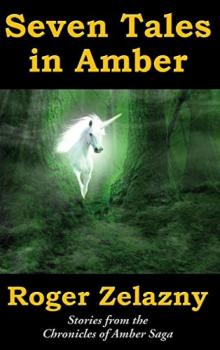 Seven Tales in Amber
Seven Tales in Amber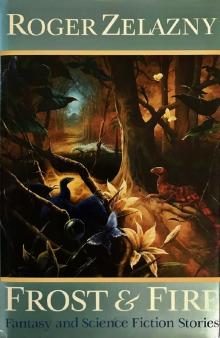 Frost and Fire
Frost and Fire Doorways in the Sand
Doorways in the Sand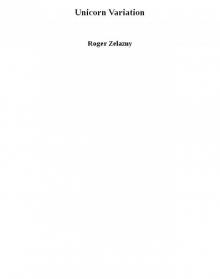 Unicorn Variation
Unicorn Variation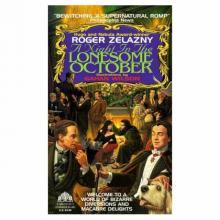 A Night in the Lonesome October
A Night in the Lonesome October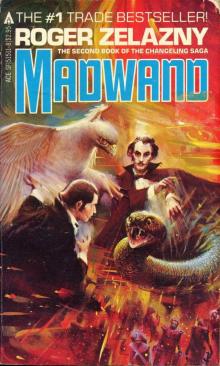 Madwand
Madwand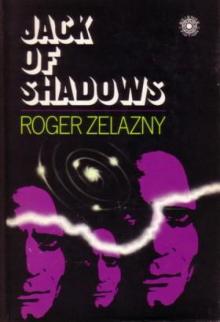 Jack Of Shadows
Jack Of Shadows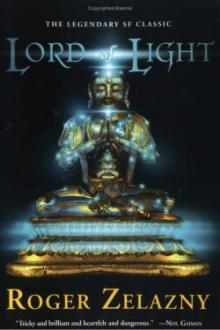 Lord of Light
Lord of Light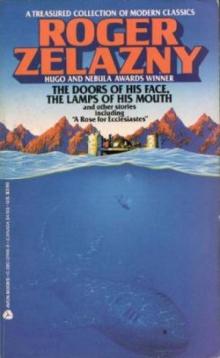 The Doors of His Face, The Lamps of His Mouth and Other Stories
The Doors of His Face, The Lamps of His Mouth and Other Stories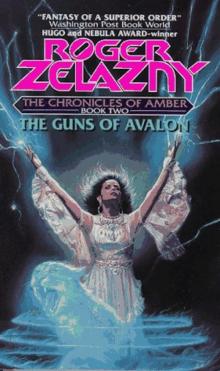 Guns Of Avalon tcoa-2
Guns Of Avalon tcoa-2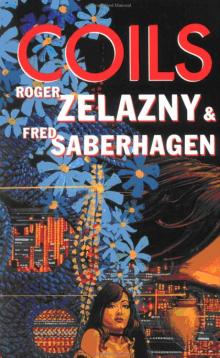 Coils
Coils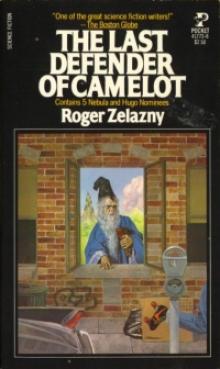 The Last Defender Of Camelot
The Last Defender Of Camelot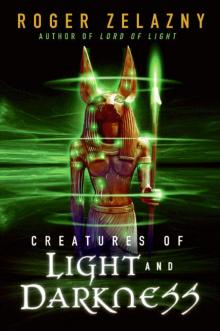 Creatures of Light and Darkness
Creatures of Light and Darkness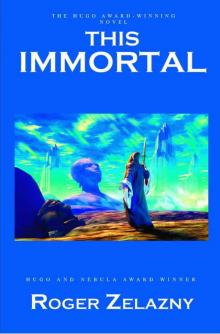 This Immortal
This Immortal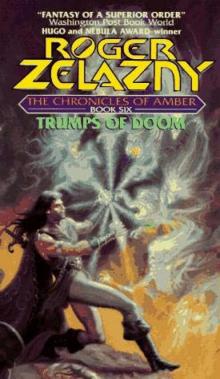 Trumps of doom tcoa-6
Trumps of doom tcoa-6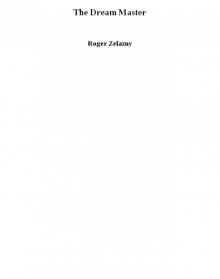 The Dream Master
The Dream Master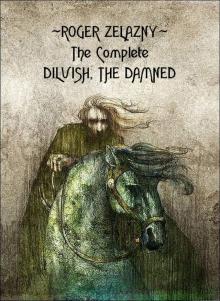 The Complete Dilvish, The Damned
The Complete Dilvish, The Damned Nine Princes in Amber
Nine Princes in Amber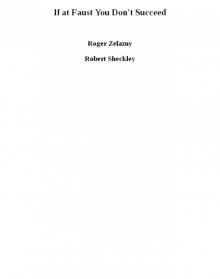 If at Faust You Don't Succeed
If at Faust You Don't Succeed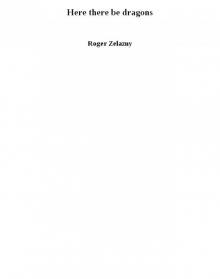 Here there be dragons
Here there be dragons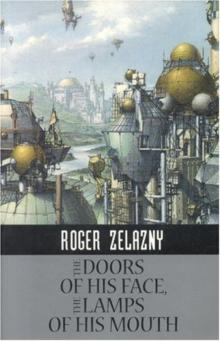 The Doors Of His Face, The Lamps Of His Mouth
The Doors Of His Face, The Lamps Of His Mouth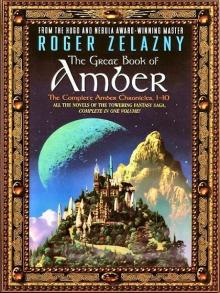 The Great Book of Amber - Chronicles 1-10
The Great Book of Amber - Chronicles 1-10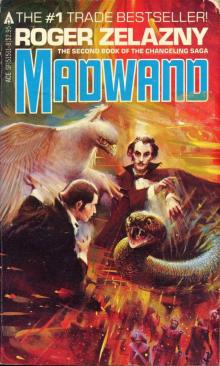 Madwand (Illustrated)
Madwand (Illustrated)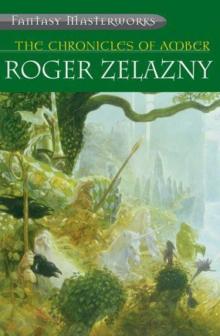 The Chronicles of Amber
The Chronicles of Amber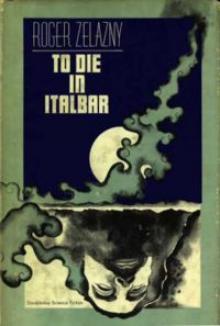 To Die In Italbar
To Die In Italbar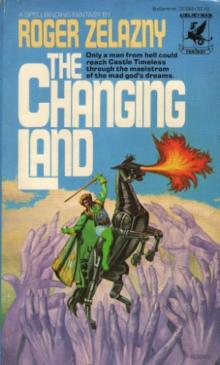 The Changing Land
The Changing Land The Furies
The Furies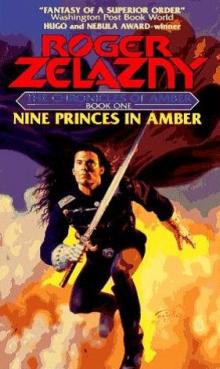 Nine Princes In Amber tcoa-1
Nine Princes In Amber tcoa-1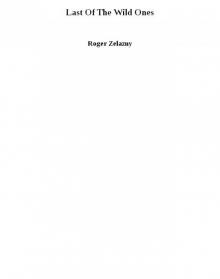 Last Of The Wild Ones
Last Of The Wild Ones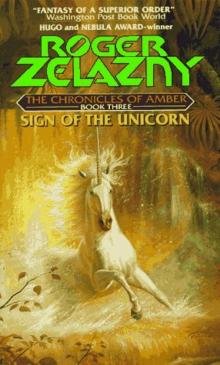 Sign of the Unicorn tcoa-3
Sign of the Unicorn tcoa-3 My Name is Legion
My Name is Legion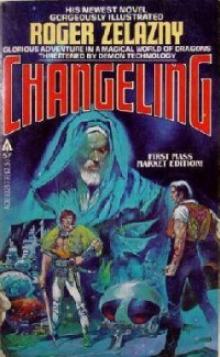 Wizard World 1: Changeling
Wizard World 1: Changeling Changeling
Changeling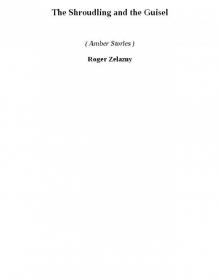 The Shroudling and the Guisel (amber stories)
The Shroudling and the Guisel (amber stories)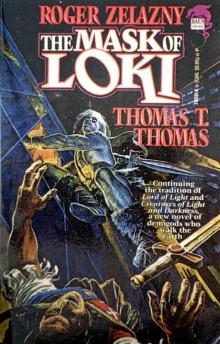 The Mask of Loki
The Mask of Loki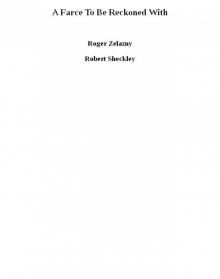 A Farce To Be Reckoned With
A Farce To Be Reckoned With Roadmarks
Roadmarks When Pussywillows Last in the Catyard Bloomed (rtf)
When Pussywillows Last in the Catyard Bloomed (rtf)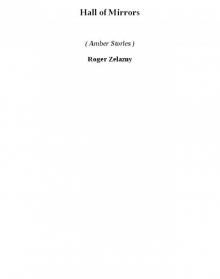 Hall of Mirrors (amber stories)
Hall of Mirrors (amber stories)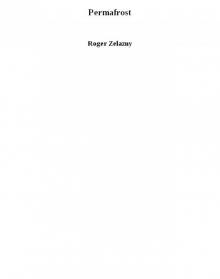 Permafrost
Permafrost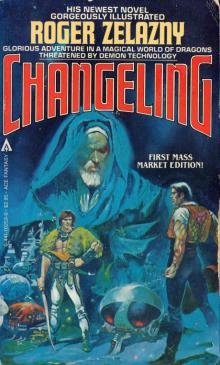 Changeling (Illustrated)
Changeling (Illustrated)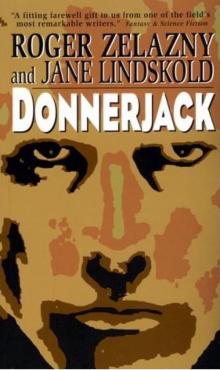 Donnerjack
Donnerjack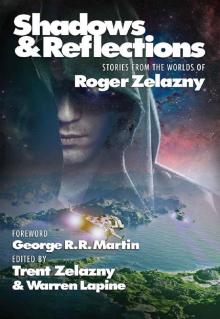 Shadows & Reflections: A Roger Zelazny Tribute Anthology
Shadows & Reflections: A Roger Zelazny Tribute Anthology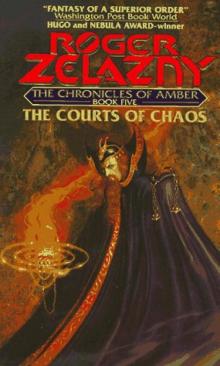 The Courts Of Chaos tcoa-5
The Courts Of Chaos tcoa-5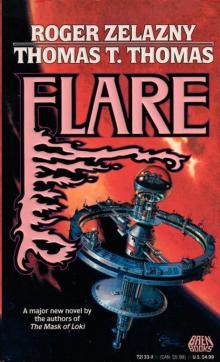 Flare
Flare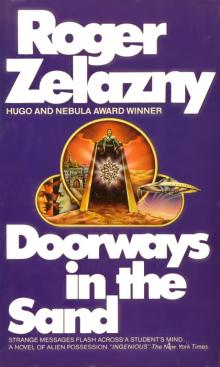 Doorsways in the Sand
Doorsways in the Sand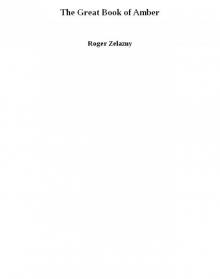 The Great Book of Amber
The Great Book of Amber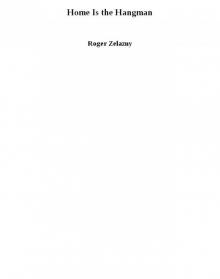 Home Is the Hangman
Home Is the Hangman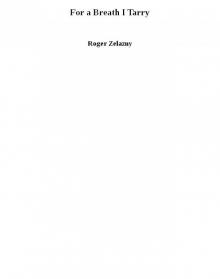 For a Breath I Tarry
For a Breath I Tarry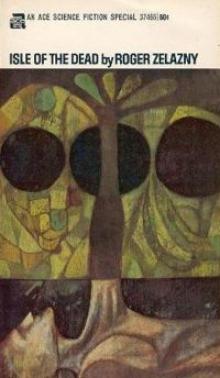 Isle Of The Dead
Isle Of The Dead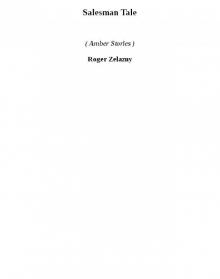 Salesman Tale (amber stories)
Salesman Tale (amber stories)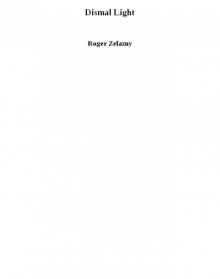 Dismal Light
Dismal Light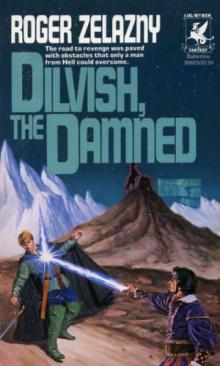 Dilvish, The Damned
Dilvish, The Damned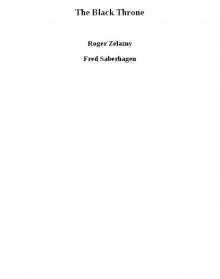 The Black Throne
The Black Throne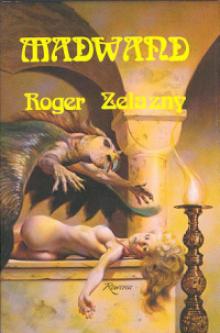 Wizard World 2: Madwand
Wizard World 2: Madwand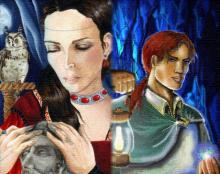 The Salesman's Tale
The Salesman's Tale